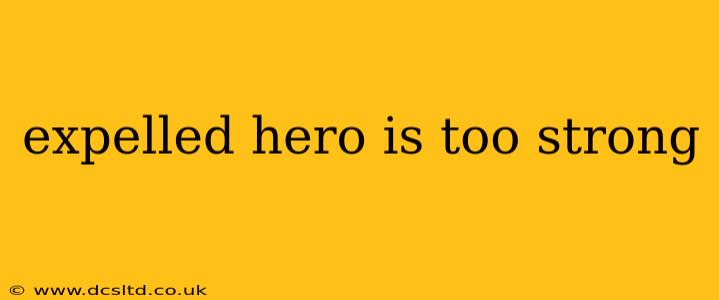Expelled Hero: Why the Power Level Often Feels Overwhelming and How to Fix It
The "expelled hero" trope—a character unjustly banished from their home or order, only to return stronger and more powerful than ever—is a staple of fantasy and superhero narratives. However, this trope can easily become a narrative crutch, leading to power creep and a sense that the story is unbalanced. The hero's sudden, often unexplained, surge in power can feel unearned, making the conflict less engaging and diminishing the stakes. This article explores why the "expelled hero is too strong" problem arises and offers solutions for crafting a more compelling and believable narrative.
Why Does the Expelled Hero Often Feel Overpowered?
One of the primary reasons the expelled hero feels too strong is a lack of proportionate development. The hero's expulsion often serves as a catalyst for their power boost, but the narrative frequently rushes through the process. Readers are left wondering how the hero achieved such a significant increase in abilities without sufficient explanation or demonstrable training. This lack of organic growth undermines the credibility of the character's enhanced capabilities.
How Can I Make the Expelled Hero's Power More Believable?
This is a crucial question that many writers struggle with. Here are some methods to prevent the expelled hero from feeling overpowered:
-
Show, Don't Tell: Instead of simply stating the hero is stronger, illustrate their growth through challenges and tribulations. Describe their rigorous training, the sacrifices they made, the mentors they found, and the battles they fought to hone their skills. This gradual progression makes their enhanced abilities feel earned and less like a deus ex machina.
-
Introduce New Threats: If the hero becomes significantly stronger, the antagonists must also evolve. Introducing new, equally formidable foes prevents the story from becoming a predictable power fantasy. These new threats can push the hero to their limits, forcing them to utilize their full potential strategically, not just through brute force.
-
Focus on Strategic Advantages, Not Just Raw Power: The hero's increased power shouldn't always translate to an automatic win. Emphasize their strategic thinking, resourcefulness, and tactical prowess. Even with superior abilities, challenges should require cunning and planning, highlighting the hero's intellectual capabilities alongside their physical strength.
-
Internal Conflicts and Consequences: The hero's expulsion often leads to internal struggles and psychological scars. Exploring these emotional consequences alongside their newfound power adds depth and complexity. Their enhanced abilities might even come at a cost, creating internal conflict that fuels the narrative. Maybe their power comes at the cost of their humanity, or maybe their increased strength is isolating.
What are Some Common Pitfalls to Avoid?
-
Unrealistic Training Montages: While training is essential, avoid unrealistic shortcuts. Years of rigorous training condensed into a short montage feels unconvincing and undermines the hero's development.
-
Unearned Power Ups: The power boost should logically stem from the experiences the hero undergoes during their exile. It should be a consequence of their growth, challenges, and choices, not a random gift or arbitrary enhancement.
-
Ignoring the Stakes: The hero's immense power shouldn't automatically resolve every conflict. High stakes should still exist, pushing the hero to use their abilities strategically and thoughtfully.
How Can I Make My Expelled Hero's Return More Impactful?
The hero's return shouldn't simply be a display of power. It should be a moment of reckoning, a climax that builds on the tension and anticipation generated throughout the story. Consider these elements:
-
Emotional Impact: The return should be emotionally charged, resonating with both the hero and the other characters. Their changed state—both in terms of their power and their experiences—should create impactful interactions and emotional weight.
-
Strategic Gameplay: The hero's return shouldn't be a straightforward assault. Their strength should be utilized strategically, perhaps focusing on undermining the antagonists' power or manipulating events to their advantage.
-
Subverted Expectations: Consider subverting the reader's expectations. The hero’s newfound strength may not immediately result in victory, perhaps even leading to new, unexpected challenges or personal sacrifices.
By carefully considering these points, writers can craft a compelling and believable narrative featuring an expelled hero whose power feels earned, impactful, and integrated into a well-structured story, avoiding the common pitfall of feeling "too strong."
